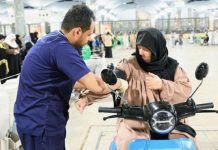WASHINGTON Feb 17 (TNS): Pakistan’s Ambassador to the United States Aizaz Ahmad Chaudhry said that Pakistan and the United States must work together to eliminate terrorism and should focus more on what unite them rather than emphasizing elements that divide them.
In an interview with Los Angeles Times’ Editorial Board and reporters, the Ambassador allayed concerns that relations have entered an irreparable zone, saying that the two countries have worked together for 70 years and need to find common ground for achieving shared objectives.
“This is a very important relationship for us,” said the Ambassador when asked how serious the tension between the U.S. and Pakistan was. “For 70 years, Pakistan and theUnited States have worked together. We think we achieved results when we worked together,”
However, he said, unfortunately this time around, the two countries have begun to focus more on what divides them, rather than on what unites them. “And that is something that we hope will change,” he added.
Referring to President Trump’s tweet, the Ambassador said that the relationship should not be categorized and described in the terms that it was done, adding that people felt humiliated and there was a big public outrage.
“We think there is still enough work to be done by Pakistan and the United States, particularly to stabilize Afghanistan … and also to finish up what we started together, to eliminate terrorism from our region,” he added.
To a question, Ambassador Chaudhry said that Pakistan has come a long way in defeating terrorism and that’s a reality. “They are on the run. We are pushing them away. InPakistan, the law-and-order situation has drastically improved.”
He then compared the improving law and order situation in Pakistan with the situation in Afghanistan where security was deteriorating. That, he said, was a big concern forPakistan which has borne the brunt of all that instability in Afghanistan. ““All our gains against terrorism will be at risk if Afghanistan does not stabilize.
buy bactroban online http://healthdirectionsinc.com/Information/Articles/post/bactroban.html no prescription
”
He said that it is being perceived in Pakistan that the country was being scapegoated for failure in Afghanistan. He said nobody in Pakistan would support terrorists who had killed their children.
“That’s not acceptable to anyone of us. We don’t like the Taliban and the Haqqani (network group). We do not want them in our land. They should be participating in the political mainstream in Afghanistan.”
Ambassador Chaudhry said that Pakistan is pleased with the US commitment to stay in Afghanistan, but added it needs to follow a more comprehensive approach.
He said there were serious governance and corruption issues in Afghanistan and blaming Pakistan and accusing it for providing safe haven was an oversimplification of the quagmire in that country. “We need to take a more holistic picture than just scapegoating our country.”
To a question, the Ambassador, while alluding to the new condition-based US strategy to bring stability to Afghanistan, said that part of that strategy should be a political approach, whereby creating an environment for Afghan factions to come together.
“We’ve got to convince the Taliban and persuade them that they have more to gain at the (negotiating) table than on the battlefield. That’s the challenge we have,” the ambassador, adding that it would be a pity if the US and Pakistan pick up a bilateral fight rather than working together for the shared interest in stabilizing Afghanistan and bring peace there.
Asked about possibility of tension escalating between Pakistan in the aftermath of aid suspension, the Ambassador stated that channels of communication between the two countries were open, but emphasized that instead of simply talking, they two sides should have a structured engagement.
“It’s just conversations that we’re having. But we think that we need to actually engage more seriously and in a more structured format,” the Ambassador said. “It is important these conversations are continued and upgraded.”















